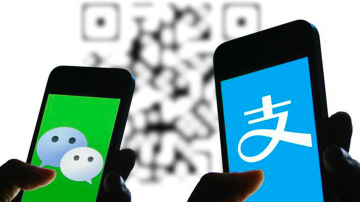
“WeChat or Alipay?” This is a question that most people living in China have heard at least once. Five years ago, a trip to the grocery store meant bringing along a wallet and physically handing over paper bills in exchange for products. Now, the wallets in people’s hands have been replaced by digital smartphones with electronic payment services. Whether it is purchasing a cup of coffee or the new Apple iPhone, one quick scan of a QR code and you’re good to go.
Throughout the last decade, China has been progressing rapidly towards the wide adoption of electronic payment services. In one word, cashless payment in China is versatile. It can be used at stores, restaurants, train stations, in taxis, between friends, and even at school. In fact, some facilities only allow electronic cash—sticking to paper bills may be more of a hassle when living in China.
Though this form of payment has become the norm in China, some other countries are still facing obstacles regarding the safety and security of ‘e-cash’. Recently, 7-Eleven launched its 7-Pay service in Japan that allowed registered users to pay with their smartphones at said convenient stores. However, within just two months of its launch, the company was forced to terminate its services after a part-time worker at one store hacked into thousands of accounts and subsequently stole millions of Japanese yen. The main cause of this incident was identified as 7-Pay’s weak security and password protection system. Police suspect that a large crime organization could be responsible for the hack, drawing attention to one of the undeniable downfalls of digital cash: the high risk of cyberattacks.
What’s more, along with the concerns of security, the increase in cashless payment services has raised unexpected criticism from its users. Coming from a cash-loving country myself, the intangible process of electronic payment has taken a long time to get familiar with. With the loss of the physical exchange of bills, I certainly feel that there is now a difficulty in effectively managing money; it becomes much easier to spend more than you have when everything is virtual. And of course, we cannot forget that we instantly become ‘broke’ if we forget our phones somewhere or if it loses power.
So why does electronic payment actually work in China?
In terms of technology, WeChat, for example, indicates that they value account protection by conducting “real-time monitoring,” “analyzing suspicious behaviors,” and offering a “24/7 support” service. Additionally, China’s journey to becoming a cash-free society is also driven by its users. The higher level of convenience when using services like WeChat Pay and Alipay has been the key factor in allowing the mobile payment revolution to happen in China.
Senior Bonny C., a frequent WeChat Pay and Alipay user, agrees that these services are “extremely useful” and “convenient” because “people no longer need to bring their whole wallet outside.” She goes on to say that electronic payment does have high security because of its passcodes and Face ID requirements. On the other hand, senior Harry J. raises the point of the vulnerability of electronic payment to hackers, saying that “when you lose [your] phone, you not only lose your phone itself but all the information related to your bank account.”
Furthermore, concerns of overspending still remain. “[Through digital payment,] money is spent without hesitating,” Bonny says, “I started spending more money online because of the convenience of online shopping.” Similarly, Harry expresses her preference for cash over e-cash due to how often she loses track of the amount of money she spends with her phone. Contrary to what Bonny says, Harry adds that she believes that “electronic payment is too complicated. You need Wi-Fi and [your] password, which is troublesome when you don’t have 4G.”
Living in China, it is nearly impossible to avoid using cashless payment. Though using these features have significantly boosted the convenience of our lives, it also comes in a package with safety risks that we must be aware of.
For more information, please visit WeChat Pay’s website, South China Morning Post, The Verge, and Business Insider.